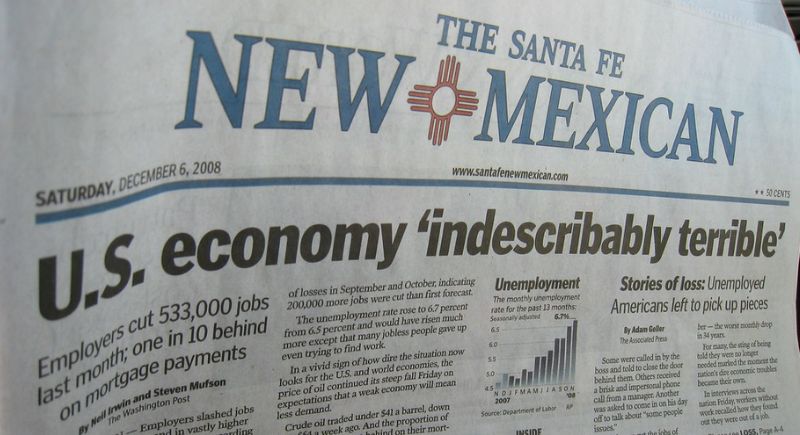12 Real Ways People Get Rich During Recessions
Markets slump. Wallets shrink. But for a rare group of strategic thinkers, that’s the moment to lean in, not back away. While most people panic-sell, the experienced launch fresh ventures and buy what others are desperate to unload. If you’re tired of sitting on the sidelines during every financial dip, it’s time to learn how real fortunes get made.
Recessions Are Gold Mines for the Prepared

Credit: flickr
Like clockwork, the economy throws a tantrum every decade or so—but the smartest folks don’t flinch. They see it coming, sharpen their strategy, and treat every dip like a clearance sale on wealth. They grab real estate, stocks, and businesses at fire-sale prices, then watch those bets pay off. Warren Buffett made billions that way during the Great Recession.
Holding Through Market Dips

Credit: flickr
When the market takes a nosedive, it’s tempting to panic and sell off investments. But history shows that staying the course often leads to recovery and gains. For instance, those who held onto their investments during the 2008 financial crisis saw substantial rebounds in the following years.
Investing in the Most Powerful Account

Credit: Getty Images
Let’s be real—adulting feels a lot less terrifying when you’ve got a stash that says, “Do your worst.” That’s the beauty of an emergency fund. It’s not glamorous, but it is game-changing. Sock away 3–6 months of must-haves—rent, ramen, the light bill—and you’ll thank yourself the next time life pulls a plot twist.
Stay FDIC-Protected

Credit: flickr
In uncertain economic times, ensuring your savings are protected is paramount. Depositing your funds in accounts insured by the Federal Deposit Insurance Corporation (FDIC) offers a safety net. You get up to $250K in coverage per depositor, bank, and account type.
Turn Multiple Accounts Into One Safety Net

Credit: Getty Images
Stacking more than $250K in a single bank account sounds impressive—until you realize what’s actually at risk. FDIC insurance only covers up to $250k. Split your funds across multiple FDIC-insured banks or use different account categories (like joint or retirement). For a smoother ride, services like ICS do the legwork for you by dividing deposits while you stick with one bank.
Skip the Local Drama

Credit: Wikimedia Commons
Not all banks are built for bumpy roads. National banks keep rolling when the economy hits a pothole—with deep reserves, wide coverage, and enough financial muscle to power through turbulence. Their coast-to-coast presence and diversified portfolios help insulate your money when smaller regional players start sweating. So, while local banks may know your name, national ones know how to navigate a storm.
Ditch the Debt Drag

Credit: 89Stocker
Getting rich in a recession doesn’t always start with buying low—it often starts with paying down what’s draining you. With credit cards charging around 24%, ignoring the interest means watching your paycheck evaporate. Use the avalanche method to attack the priciest balances first, and don’t even think about swiping for non-essentials.
Let Pros Do the Talking

Credit: Canva
Drowning in debt isn’t a solo sport—and luckily, you don’t have to do it alone. Nonprofit credit counseling agencies offer relief with personalized budget plans and debt management programs. On average, clients slash over $3,600 in revolving debt in 18 months. Add in negotiated lower interest rates and waived fees, and you have a recession-proof strategy that works.
Turn Market Panic Into Profit

Credit: Wikimedia Commons
Warren Buffett didn’t flinch in 2008—he tossed $5 billion into Goldman Sachs and cashed in on a plump 10% dividend. John Paulson made $20 Billion shorting subprime mortgages. You don’t need billions to play smart—just research, discipline, and a focus on long-term value. Hunt for value, ignore the noise and treat every downturn like a wealth-building blueprint.
Index Funds Quietly Dominate

Credit: Getty Images
Index funds let your money work smarter with minimal fees and maximum spread. Since they mirror major market indexes like the S&P 500, they cut out pricey management and still deliver strong returns over time. Less overhead means more gains in your pocket. With consistency, patience, and zero panic-selling, your investments quietly stack up.
Set It and (Almost) Forget It

Credit: Rido
Retirement planning doesn’t have to feel like assembling IKEA furniture without the manual. Target-date funds can help adjust your investment mix as you age. Start aggressively with more stocks, then gradually shift into safer assets like bonds as retirement approaches. It’s called a glide path, and it’s designed to match your risk level over time.
Let a Robot Manage Your Money

Credit: PhonlamaiPhoto’s Images
No spreadsheets, no stock-picking stress—robo-advisors turn investing into the smoothest ride in town. These sleek digital pros take your goals, mix in your risk tolerance, and whip up a fully diversified portfolio—then quietly tweak it as markets shift. They even keep fees low, so more of your money actually works for you.
Profit from the Pantry

Credit: Getty Images
Toilet paper, toothpaste, and your favorite cereal don’t care about the stock market’s mood swings—and neither do the companies behind them. That’s why sharp investors load up on consumer staples when times get tough. These essentials keep flying off shelves, even during recessions, which gives their stocks a solid foundation.
Stick to the Plan and Stack Gains

Credit: Getty Images
Seasoned investors know that staying strapped in during market dips is where the real magic happens. Long-term investing taps into the power of compounding, where your money earns money, and then that money earns even more. Every dollar reinvested quietly builds momentum and turns small gains into serious money.
Compounding Rewards the Patient Investor

Credit: Getty Images
Trying to time the market is like jumping in and out of a moving car—you’re more likely to get hurt than arrive faster. Just missing the 10 best days in 30 years can slash your returns in half. Instead, smart investors stay in the game. A steady, long-haul approach captures the biggest gains.